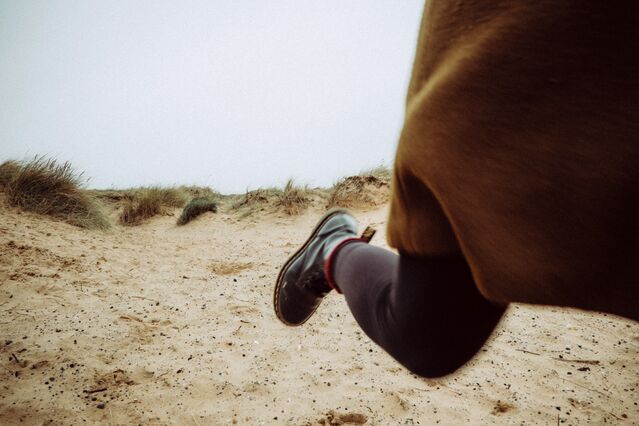Attention
What’s So Hard About Saying 'This Is Hard'?
The surprising obstacle to practicing self-compassion.
Posted December 4, 2022 Reviewed by Jessica Schrader
Key points
- Research into self-compassion reveals the remarkable benefits of being able to bring kind, mindful awareness to ourselves.
- It is mysteriously challenging for many of us to practice self-compassion in the moments when we most need it, when we are vulnerable.
- The hidden obstacle to being self-compassionate is our unconscious reflex to avoid unrest, a precious inner alarm meant to get our attention.

As you run toward the bus stop, you hear the engine rev and see your bus lurch away into traffic. You’re already running short on time and the next bus isn’t for another 10 minutes. Do you say to yourself kindly, “This is hard,” acknowledging you are only human and standing back to gain a perspective on things? You do? Wow. Then this post may not be for you, and I might know of a job offer at a nearby monastery.
But if you are more likely to curse under your breath and chide yourself for being a disorganized mess, or tell yourself “it’s no big deal” as you ignore the pressure in your head and pop a headache pill while scanning your social media feed, or start running mental movies where your boss loudly announces your late arrival while your colleagues give you the death stare, or blame the transit system for being run by a group of sadistic robots, welcome to the challenge of self-compassion.
A buffet of self-compassion goodies
Research into self-compassion has proliferated over the past 15 years, revealing remarkable benefits of being able to bring kind, mindful awareness to ourselves. It turns out that when we are able to be self-compassionate, we have increased happiness and life satisfaction, more motivation to make good lifestyle choices, better relationships, improved health outcomes, lower anxiety and depression, and increased resilience in the face of challenges. And the boot-camp approach of criticism and shaming, far from improving performance, produces lowered motivation and mood, increased anxiety, lower resilience, and a reduced likelihood that we will learn from failures.
So why aren’t we all just stepping up to the buffet of self-compassion goodies? To answer that question, we need to dig a bit deeper into what is happening in the moment self-compassion is needed.

The ejecto-button moment
We are vulnerable. Life is painful, filled with loss and disappointment and limits and uncertainty. That is a fact of life. It is “the” fact of life. We are all going to face illness and aging and death. That fact is in the background of our minds most of the time, an abstraction that we “know” but do not consciously feel.
But every so often, and more often than most of us consciously register, that fact becomes immediate and personal. The moment our longing for something, anything really, to be a certain way (to get a good night’s sleep, make someone happy, not spill your coffee, finish everything on the to-do list, not get COVID, feel calm, make sure your kids get along) bumps up against the limits of reality—sleep has to come to you, other people are in charge of their own happiness, gravity and momentum are real forces, time is a real thing, little viruses are sneaky, your nervous system has its own mind sometimes, and your kids are people too—that's when vulnerability shifts from an idea to an embodied experience.
That’s the precise moment we most need to come home to the body and feel. And that’s also the ejecto-button moment when we are triggered to avoid our inner experience. We exit from what it feels like to be vulnerable via worrying and judging and distracting and controlling and rationalizing and juggling chainsaws and doing just about any trick to deny the painful truth that we are not the boss of very much at all.
Oops, we have a dilemma
When we are vulnerable, unrest stirs. That spike of agitation and muscle tension tries to get our attention at the optimal moment for growth. Unrest wants to wake us up so we can pay inner attention, feel adaptive emotions, and grow capacities for living our biggest, richest life.
In my new book, Embracing Unrest: Harness Vulnerability to Tame Anxiety and Spark Growth, I illustrate how the feeling of unrest is physiologically indistinguishable from fear. The good thing about that is unrest has the power to break through our nattering inner narrative that takes us out of the present. The bad thing is that it evokes our reflex to avoid whatever is here and now.

Waking up instead of freaking out or pressing snooze
Unrest only works as a wake-up call if we perceive it accurately. When we sense the alarm in our body, we don’t need to worry. We don’t need to press snooze and ignore ourselves. We do not have to obey that old wiring to avoid inner experience. We have a choice to wake up and soothe our bodily arousal with warm attention. Then we can open to the truth of our vulnerability and care about ourselves—otherwise known as being self-compassionate.
When unrest is invisible to us, we react unconsciously to our embodied wake-up call and abandon ourselves in moments of vulnerability without realizing, missing out on our most potent opportunities to feel and grow.
Common humanity as the sticky, tricky piece
Kristen Neff has identified three components to self-compassion: self-kindness, common humanity, and mindfulness. Common humanity refers to the fact that we all make mistakes and will feel pain.
Our common humanity is the tricky place where most of us get stuck. Because our common humanity is our vulnerability. And that stirs unrest.
The hidden obstacle to being self-compassionate is our unconscious reflex to avoid unrest. Even when we understand the value of self-kindness and practice mindful awareness, if we don't understand unrest as our call to come home to the body right now, we will be unconsciously ejected from the moment. We'll be face-planting in the Hagen Daz before we realize we really, really, really want to hear back from our new love interest and cannot singlehandedly make that happen.

Becoming a self-compassion wizard
Take a moment right now and let yourself feel something you long for. Feel what your longing feels like and let it matter a moment. Then turn your awareness to the many things that might bear upon how or when or whether what you long for will happen. As you visualize all the ways reality could throw curveballs and delays and brick walls in front of you, notice how unrest stirs.
Bring warm interest to the places in your body where you feel tension and agitation. Say a warm hello and hang out there with genuine interest, not trying to fix or change what you feel, accompanying your body with non-judgmental awareness. Block any stories that try to remove you from giving your undivided attention to your bodily sensations.
As you do that, you may feel a rise of emotion. There may be a feeling of anger as you protest the unfairness. Welcome that. Feel that as a physical feeling and ride it out like you are surfing a wave. You will likely feel a wave of sadness too and let yourself ride that as it crests and ebbs. Stay with it and feel the physical feeling of that helplessness. Be patient, go slow. Even slower than you think you need to go.
Then you will find yourself in a still place, a place of surrender. You can rest there. Feel your stillness in this place of stillness. And notice how you are still “here” and OK, even though you do not have control, even though you cannot singlehandedly make happen what you want. Feel how you matter, here and now. Recognize yourself as a vulnerable human who is worth loving, even when you don’t feel good, even when you cannot bend reality to your will. Especially then.
That is success. You have tapped into the power of soothing unrest to become a self-compassion wizard. Now saying “this is hard” is not that hard at all.
References
Germer, Christopher (2009). The Mindful Path to Self Compassion: Freeing Yourself From Destructive Thoughts and Emotions. New York: Guilford Press.
Neff, Kristen (2015). Self Compassion: The proven Power of Being Kind to Yourself. New York: William Morrow Publishing.
Parker, Sandra (2022). Embracing Unrest: Harness Vulnerability to Tame Anxiety and Spark Growth. Vancouver: Page Two Press.




